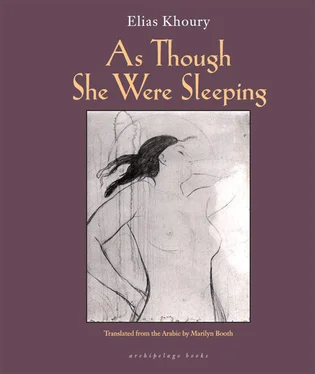You are a real poet!
I learn poetry by heart but I don’t want to be a poet. My love, when you are a child of this language borne on odes that balance ecstasy with wisdom, and that dance to the essential union of still and moving letters, the tempo created by a flux of syllables, then it’s more than enough to recite poetry composed by others, to play with it as you like, to immerse yourself joyfully in its rhythms and cadences at whatever moment suits you. But these poor miserable poets have always stumbled under the weight of the poets who came before them. They cannot figure out how to escape the burdens imposed by crystalline poems composed and recited in earlier eras. So the later poets grow careless, or they shrug off the weight of it, or they imitate, or they kill themselves. Listen, my love, listen!
That day Mansour was saying goodbye to his Beiruti beloved for the last time. He would go to Galilee’s capital and make final arrangements about the house to which they would come as a married couple. He would bring his mother to Beirut for the wedding, he said then. But the mother did not come, as it happened, because of the revolt flaring up in Palestine. Mansour would marry without any family members to witness it. And when the family gathering on that stormy night in December broke up, he turned to his beloved and recited his lines on paleness and poetry. He wanted to recite the entire poem but he could only remember its opening lines.
Say farewell to Hurayra, for the caravan leaves
Are you man enough to make your final farewells?
Do you know how el-A’sha finishes the poem? he asked her, but he did not wait for an answer. I swear it’s as if he’s talking about you, Milia!
About me?
Just about. I want you to feel this poetry as if he composed for you. Listen!
Noble, tall and slender, she’s a chiseled silhouette
Her gait is most stately, all vigilant and wary
As if her path onward from a neighbor friend’s abode
Is a pale cloud passing, to neither hasten nor tarry
See, Milia, you are the vigilant one, pale and wary. No, she’s not wary, she just walks as if she is wary. Paleness, a chiseled neck and face — these aren’t meant as similes, they’re descriptions of a real person. But a wary gait, that’s just a simile. Pale and looking wary. So, not really wary.
What’s the difference between looking and being wary?
The difference is the poetry. The resemblance. The simile. Like, one thing makes you think of another, and so on.
I don’t understand, she said. And then, what’s the difference between description and similarity? If someone says abyad , white, yes, I get that — it means, his color is white. A noun, isn’t it?
No, Milia, sweetheart, it’s not a noun. It’s a kind of adjective made from a verb, it’s called an elative, a form used for comparisons, you know — well, anyway, I swear I don’t know why, I just read poetry and then I feel like I’m going to soar into the sky. You fly with the meaning, it’s intoxicating, it makes shivers run up and down your spine it’s so beautiful. So, I mean, how could I possibly come up with my own poetry?
And he, the poet — what was his name?
El-A’sha. He was half blind and that’s why they named him el-A’sha.
Blind, and he could see the beauty of a woman?
He saw with his heart, not with his eyes. He would go all confused and flustered in front of women, just like I am with you!
I came for a visit and Hurayra cried and pined
Woe is me! I fear you and fear for you, man of mine
Milia didn’t ask him why he didn’t write poetry, because she was afraid. Being afraid was no simile in this case; it was a real adjective. She had made her decision and there was the end of it. It had not really been her decision, though. Najib had decided. He had gone with her brother Salim. The dream told her that her future would be written in a faraway town and she understood that she must let her pallor melt and flow in the hands of this strange man of whom she knew nothing except that he resembled her brother Musa. Milia perceived the swarthiness of this man’s skin tinting her own body, penetrating it. She knew instinctively that she must peel off her words as she peeled off her clothes. A woman strips herself naked when she tells things while a man clothes himself in his words. That is how she imagined herself in bed: he would be putting things on while she was taking things off. But she could not find the right words and so she decided not to speak. Not to take anything off. Well, no, she did not decide, after all; her mother had told her in no uncertain terms that she must obey him in bed. Men were of different kinds, her mother lectured her. Some of them, especially these days, demanded that a woman be naked in bed, so she’d be like soft warm dough in a man’s hands.
That’s the way they like it, and you must do as your husband wants.
What did my father do? asked Milia.
What do you want with your father, God have mercy on his soul? It’s wrong to talk about the dead. But no, your papa did not take my clothes off. He took off all of his clothes, but I was too embarrassed. I mean, how are you supposed to take your clothes off when the little ones are right there in the house, sleeping? He didn’t care one way or the other. He would get under the sheet and take off everything and say to me, Whatever you want, just stay however you want.
And then?
One of these days soon you’ll know how it goes.
The mother explained to her daughter that in bed she must swallow her own pleasure, keeping it to herself and not allowing it to get the better of her. It all must stay inside, she said. You must be absolutely sure of that, my girl. It scares a man to hear a woman breathing heavily or to see her pleasure rising with his. It happened to me, and I learned my lesson right quickly — but why am I telling you all of this? Well, these sorts of things aren’t talked about, but. . there isn’t a better man than your papa, God rest his soul, but I couldn’t stand it any longer. We had our children, enough is enough. I began to feel I couldn’t do it anymore, and I smelled the stink of sin — but maybe I wasn’t good enough to him, bless his soul.
It’s the nun’s fault, she put these ideas in your head.
Don’t bring the nun into it, she’s a saint! May God permit us to drink of her blessings.
Milia understood things differently. She saw the tiny airborne bodies and went silent. Najib had disappeared from her life and a black curtain had come down over his story. Everyone whispered the news, back and forth it went but quietly, quietly, in the belief that she didn’t know. But she knew everything. She saw the truth sketched on Najib’s eyeballs when the birds fell dead from the sky. It was not easy for her to recall the dream of the birds. To find it she had to plunge into the darkness and when she did, she was rendered incapable of saying anything about it. She had learned to classify her dreams. They were of three sorts.
The first sort of dream was the one that took place on the surface of things and arrived in the early morning. The shallow dream’s role was to motivate her to wake up. These were simple dreams crafted out of the details of daily life. They helped one’s eyes stay closed for a while longer but also to face the light of morning. This sort of dream did not concern Milia because the moment she got up it would have already vanished from her mind. Indeed, she could stop its march by opening her eyes and when it faded she would close them again to go to a place that was deeper, wanting to regain her real dream, which had hidden itself away somewhere beneath her eyelids.
The second kind of dream planted a cozy hedge around you. Milia took this sort of dream with her to sleep. Closing her eyes, she felt her head tingle and go numb, and she began to weave stories and images. Bedtime means a person plumps up a pillow on which to lay her head. Milia’s pillow was not made from cotton or wool or feathers but from stories. She would lay her head back on the long mound of pillow that also served as a backrest and ply her stories slowly. Images moved before her eyes and she selected those she wanted to use, arranging the elements according to her taste. Najib the lawyer became Wadiie the baker, and Wadiie became the priest at the Church of the Archangel Mikhail, and then the priest was passionately in love with the saintly nun, and so forth. .
Читать дальше












